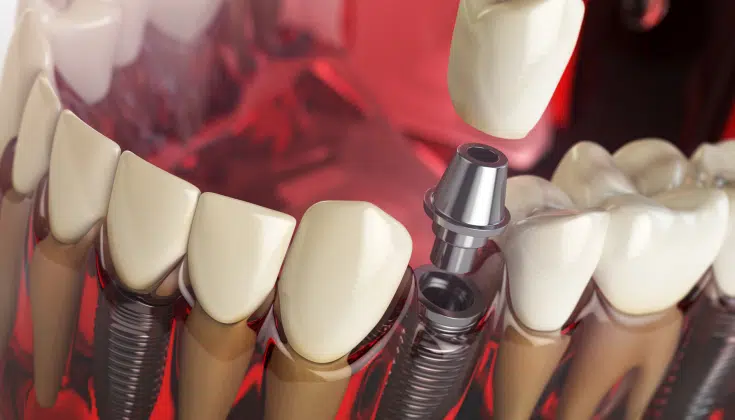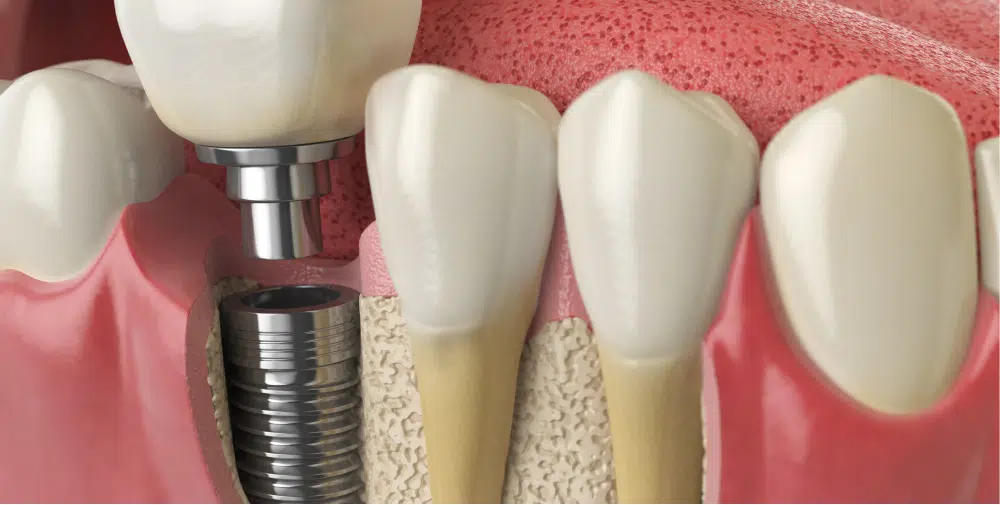Dental Implants
Trinity Valley Oral Surgery & Dental Implant Center understands the challenges patients struggling with damaged or missing teeth may face. Led by Dr. Draper and Dr. Gibbins, our office specializes in dental implant surgery, offering a permanent solution to restore your smile and confidence. We understand the profound impact that tooth loss can have on your well-being and quality of life, and are dedicated to providing top-tier dental implants in Forney and Fate, TX, to bring back a smile you’ll want to show off.

What Are Dental Implants?
A dental implant is a state-of-the-art solution for replacing missing teeth. It consists of a biocompatible titanium post that is surgically placed into your jawbone, acting as a replacement for the tooth root. This post is then topped with a crown, bridge, or denture, which mimics the appearance and function of natural teeth. Dental implants are renowned for their strength, durability, and natural look. We even match the color of your existing teeth for a seamless smile!

When Are Dental Implants Recommended?
Dental implants are recommended for a variety of situations, including:
- Single Tooth Replacement: When you’ve lost a single tooth due to injury, decay, or disease.
- Multiple Teeth Replacement: Ideal for those missing several teeth in a row where both the function and aesthetic of your smile is compromised.
- Full Arch Replacement: A solution for individuals who have lost all teeth in one or both jaws, acting as a complete replacement for a wonderful smile.
- Improved Denture Stability: Implants can be used to anchor dentures securely, enhancing comfort and functionality and removing the need for any denture adhesives.
Benefits of Dental Implants
Long-Term Solution
Unlike other tooth replacement options, dental implants are designed to last a lifetime. They integrate with your jawbone, providing a stable and durable foundation for your new teeth. With regular maintenance and checkups, your smile will feel radiant as you for a long time to come!
Natural Look and Feel
Implants are meticulously crafted to resemble your natural teeth in color, shape, and function, offering a seamless addition to your smile.
Improved Oral Health
Dental implants preserve your jawbone and oral structure, preventing bone loss that often occurs with tooth loss. They also allow easier access between teeth for better oral hygiene compared to traditional bridgework. With a missing root, your teeth may start to shift to close the gap left behind. Dental implants act as a replacement for missing roots and prevents the shift from ever happening.
Enhanced Quality of Life
Implants restore your ability to chew your favorite foods and speak with ease, enhancing your overall quality of life. They eliminate the discomfort and insecurity often associated with missing teeth.
Who is a Good Candidate for Implants?
Ideal candidates include individuals with:
- Adequate bone density to support the implant
- Good overall oral and general health
- Non-smokers or those willing to quit smoking during the treatment period
- Commitment to maintaining good oral hygiene and regular dental visits
Many senior patients wonder whether implants are right for them and the answer is yes! They’re a safe and durable tooth replacement solution for patients of all ages. Learn more about dental implants for seniors here.
Why Choose an Oral Surgeon for Implant Placement?
Oral surgeons like Dr. Draper and Dr. Gibbins possess specialized training and experience in dental implant surgery. Their expertise ensures precise placement of implants, minimizing complications and maximizing success rates. They are also skilled in advanced techniques that allow for less invasive procedures and faster recovery times. You can rest assured knowing you’re in good hands!
The Surgical Procedure
Typically, the process of getting dental implants is completed in two stages. Initially, the implants are positioned within the jaw. Over the next three to six months post-surgery, these implants are under the gums, gradually integrating with your jawbone. During this period, it’s common for patients to wear temporary dental solutions such as flippers or dentures and stick to a soft diet. With a little time to adjust, the healing will happen as you go about your day and before you know it, your permanent replacement will be ready for your perfect smile.
Once the implant has successfully fused with the jawbone, the next step is initiated. Dr. Draper or Dr. Gibbins will expose the implants and attach abutments, which will emerge through the gums and serve as the foundation for the artificial teeth. The artificial teeth, once in place, will hide the implants. This entire process often spans four to six months. The majority of patients find that this procedure causes minimal interruption to their everyday activities.
Surgical Advances
Utilizing the latest advancements in dental implant technology, our friendly specialists are skilled at inserting single-stage implants. These implants eliminate the need for a second surgical exposure but do require at least ten weeks of healing before the placement of artificial teeth. Additionally, it’s often possible to insert implants simultaneously with tooth extraction, reducing the number of surgeries and decreasing the overall treatment time until completion.
The placement of dental implants is a collaborative effort between an oral and maxillofacial surgeon and a restorative dentist. Dr. Draper or Dr. Gibbins is responsible for the actual implant surgery, including any initial tooth extractions and potential bone grafting. Meanwhile, the restorative dentist (your dentist) is in charge of fitting and creating the permanent prosthesis. They will also handle any temporary prosthetic needs throughout the implant process so you can wear your smile proudly while you wait.
What Types Of Prosthesis Are Available?
We offer various prosthetic options tailored to your specific needs:
- Single Crowns: Perfect for individual tooth replacement, providing a natural-looking solution.
- Bridges: Ideal for replacing several missing teeth in a row.
- Overdentures: Snap-on dentures that offer improved stability and function compared to traditional dentures.
Dr. Draper performs in-office implant surgery in a hospital-style operating suite, thus optimizing the level of sterility. Inpatient hospital implant surgery is available for patients who have special medical or anesthetic needs or for those who need extensive bone grafting from the jaw, hip, or tibia.
Why Select Dental Implants Over More Traditional Types Of Restorations?
Several compelling reasons highlight the limitations of traditional dental solutions:
- Preserving Healthy Teeth: Traditional bridgework often involves altering the structure of surrounding healthy teeth. Why undertake such alterations when there are less invasive options available?
- Functional Limitations of Dentures: Regular dentures can significantly limit the types of food you can comfortably consume. Challenging items like steak, corn on the cob, or apples may become difficult or impossible to enjoy. Modern dental technologies offer solutions that allow you to return to your normal dietary habits without such restrictions.
- Convenience and Comfort Issues: The routine of removing and cleaning dentures or partials daily, especially at night, can be cumbersome. Additionally, the risk of dentures slipping or causing discomfort, particularly in social situations, poses both a practical and an emotional challenge. Traditional dentures are also known to be prone to trapping food, increasing your risk for bad bacteria to form and affecting your overall oral health.
What Type Of Anesthesia Is Used?
The majority of dental implants and bone grafts can be performed in our office under sedation combined with local anesthesia. We understand that any dental procedure could cause some anxiety in patients, and we go above and beyond to deliver the best in Sedation Dentistry options so you can feel relaxed and at ease while getting the care you deserve.
Do Implants Need Special Care?
Once the implants are in place, they will serve you well for many years if you take care of them and keep your mouth healthy. This means taking the time for good oral hygiene (brushing and flossing) and keeping regular appointments with our dental specialists!
Frequently Asked Questions
Q: How long do dental implants last?
A: With proper care and maintenance, dental implants can last a lifetime. They are a long-term investment in your oral health and quality of life.
Q: Is the procedure painful?
A: Most patients report minimal discomfort during and after the implant procedure. We use local anesthesia and offer sedation options to ensure your comfort throughout the process.
Q: How long is the recovery time?
A: Recovery time varies depending on the individual and the extent of the procedure. However, most patients return to their normal activities within a few days. Complete healing and integration of the implant typically occur over several months.
Q: Can implants fail?
A: While dental implants have a high success rate, there are rare cases of failure. Risk factors include poor oral hygiene, smoking, and certain medical conditions. Our team takes every precaution to minimize these risks.
Q: Are they covered by insurance?
A: Coverage for dental implants varies by insurance provider. Our office staff can assist you in understanding your benefits and exploring financing options.
Q: What sets Trinity Valley apart in implant dentistry?
A: Our expertise, advanced technology, patient-focused approach, and streamlined surgical techniques set us apart in the field of implant dentistry.
Regain Your Confidence and Smile With Dental Implants in Forney and Fate, TX
Ready to explore the life-changing benefits of dental implants? Contact Trinity Valley Oral Surgery & Dental Implant Center to schedule a consultation with Dr. Draper or Dr. Gibbins. Let us guide you towards a healthier, more confident smile!
Learn more about our dental implants by visiting our FAQ page here, or contact our dental office here.